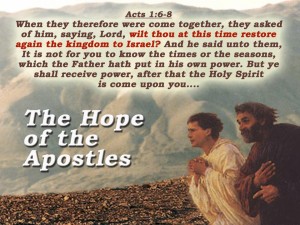 The Apostles’ Doctrine (Acts 2:42) is founded on the Old Testament Scriptures. During the time of the preaching of Christ and later on, the apostles, only the Old Testament was available for reference. Careful reading of the apostles’ teaching, in the Acts of the Apostles and the Epistles, clearly shows that the Old Testament is frequently referred to as the foundation (note Ephesians 2:20 – “prophets”). The Hebrew Old Testament was the first scripture ever translated into another language (Greek) nearly 300 years before Christ was born. This meant it was ready for use outside of Israel in the preaching work of the apostles.
The Apostles’ Doctrine (Acts 2:42) is founded on the Old Testament Scriptures. During the time of the preaching of Christ and later on, the apostles, only the Old Testament was available for reference. Careful reading of the apostles’ teaching, in the Acts of the Apostles and the Epistles, clearly shows that the Old Testament is frequently referred to as the foundation (note Ephesians 2:20 – “prophets”). The Hebrew Old Testament was the first scripture ever translated into another language (Greek) nearly 300 years before Christ was born. This meant it was ready for use outside of Israel in the preaching work of the apostles.
The basis of doctrine must be the Word of God – 1 Timothy 3:16; John 10:35
There are two aspects to the doctrine: (Acts 8:12)
- Things concerning the Kingdom of God, and
- The name of Jesus Christ
A The Kingdom of God
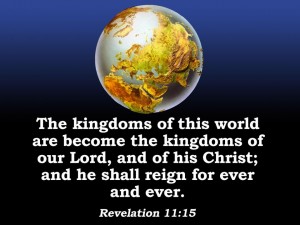 a) The promises
a) The promises
God has made three key promises, which are referred to many times in both Old and New Testaments.
|
Adam and Eve Genesis 3:15 |
The coming of the woman’s seed who would redeem. He would effect a mortal blow to sin and death (symbolised in the serpent) |
|
Genesis 12:1-3 Genesis 17; 22:15-17 |
Abraham was promised a land, a nation, and an international blessing. His “seed” would “possess” (control) the world. (Romans 4:13) |
|
2 Samuel 7:10-16 |
David was promised an eternal place for the people of Israel. He was also promised a throne and an everlasting kingdom. His great son (who would also be the Son of God) would occupy the throne. b) The Israelitish hope – the constitution of Israel The constitution of Israel, its laws and organisation, form the basis of the Kingdom of God. The Kingdom of God has already existed; it was formally constituted when the twelve tribes of Israel were brought out of Egypt, and set up as a nation (Exodus 19:5,6) Because of wickedness of some later kings, it was temporarily overturned “until he come whose right it is, and I will give it him” (Ezekiel 21:25-27). Jesus Christ has this right divinely given to him as Son of God (Luke 1:32,33). He is yet to come and take the Kingdom (Acts 1:11) and reign over all the world (Revelation 11:15; Psalm 72) |
c) The second coming of Christ
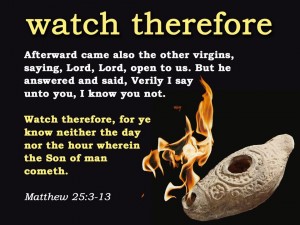 This is a dominant Bible doctrine, necessary for the fulfilment of the promises to Adam and Eve, to Abraham and to King David. The Church has corrupted this teaching.
This is a dominant Bible doctrine, necessary for the fulfilment of the promises to Adam and Eve, to Abraham and to King David. The Church has corrupted this teaching.
In the book “Religious Sects” by Bryan Wilson , he writes concerning this: “Until the development of modernist ideas, the second coming of Christ was a belief required of Christians. Until Augustine provided a spiritual interpretation of the church as the kingdom of heaven where the saints would reign, many early Christians expected Christ’s early advent.
‘As the church became established, and as its hierarchy became men of influence in the world and its chief laymen wealthy and powerful, so the appeal of the advent receded. Scriptural interpretation became spiritualised and Greek concepts of souls migrating to heaven displaced Jewish ideas of resurrection and transformation of the world. But the scriptures affirmed Christ’s second coming, and in periods of social unrest the church found these biblical ideas regaining currency.” Chapter 6, page 93
B The Name of Jesus Christ
The Name of Jesus Christ expresses his mission. Jesus is the Greek word for the Hebrew “Joshua” – which means “Yah (God) saves”. Christ is the Greek word for the Hebrew “Messiah”, which means anointed or chosen. Hence the son of Mary was chosen by God to achieve the work of salvation – reuniting mankind with their Creator. As Son of God he represented God to man; as Son of man he represented man to God.
a) His nature
The problem was that mankind were alienated from God through sin. “All have sinned and come short of the glory of God” (Romans 3:23). For this reason, Jesus was born of a human mother, so that he could deal with the problems to which human nature was prone at their source. He is literally son of man and son of God (Luke 1:35; Romans 1:4). As Son of God, he was strengthened by his Father’s character to triumph over evil. This was a work of God. “God was in Christ reconciling the world unto himself” (2 Corinthians 5:19) God’s dominion had to be re-established in flesh; in Christ first.
b) His sacrifice
Though sinless, Jesus himself needed saving from death (Hebrews 5:7-9). He readily gave up his self will to do God’s will (Luke 22:42; Hebrews 10:7-10). He overcame all the lusts and temptations humanity suffers. The following quotations show that the problem of sin which resided in human nature, was put to death in Christ’s death:
- The body of sin destroyed Romans 6:6
- He condemned sin in the flesh Romans 8:3
- Putting off the body of the sins of the flesh Colossians 2:11
As a result, his death also testified to God’s supremacy and justice (Romans 3:23-25). Unless Jesus is seen as experiencing the human condition, he cannot possibly represent us, nor die on our behalf.
c) His priesthood
As a priest, he must have compassion (fellow feeling) with others and, for this reason, Jesus was human as well as being Son of God. His humanity means he is able to respond to our needs for he has experienced our temptations and our condition (Hebrews 2:14-18). “For we have not a high priest who cannot be touched with the feeling of our infirmities; but was in all points tempted as we, yet without sin. Let us therefore come boldly unto the throne of grace, that we may obtain mercy, and find grace to help in a time of need” (Hebrews 4:15,16)
d) His destiny
Because he had overcome sin in his life, he was given immortality, and conferred with honour and position, “made both Lord and Christ” (Acts 2:36). This position qualifies him to be ruler (2 Samuel 23:3; Revelation 3:21), and so he shall be King over all the world. All shall honour him (Revelation 5:9-13).
C The promise to Abraham
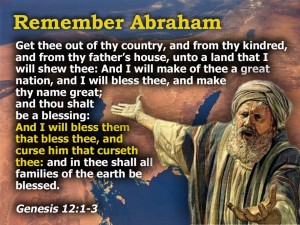 We have dealt with the Promises in some detail in the third lesson of First Steps to Bible Knowledge. A summary is:
We have dealt with the Promises in some detail in the third lesson of First Steps to Bible Knowledge. A summary is:
The Promise to Abraham
Genesis 12:1-3 Personal blessing
A National blessing
International blessing
Genesis 12:6 A seed (descendant)
Genesis 13:14-17 A land, for ever
The Covenant
Genesis 15:18-21 The area of land is defined
The OATH
Genesis 22:16-17 Guaranteed by God as unchangeable (Hebrews 6:13-18)
The seed personalised – “he” – Jesus Christ (Galatians 3:16)
The seed to “possess” the gate of his enemies, ie: the civil, economic and political territories of the world. (Romans 4:13)
These promises form “the gospel” (Galatians 3:8)
When we look at two of the three great promises, in the context of the preaching of the apostles in Acts, we see that the apostles referred to these promises, as a necessary part of the work of the Lord Jesus Christ. No Bible study, no Bible exposition is effective unless it has the same basis as the apostles used.
The promise to Abraham encompasses a land and a people and a international blessing.
The promise is confirmed by covenant in Genesis 15 and the borders of land defined.
The Oath in Genesis 22 guarantees fulfilment, and incorporates the whole world.
How did the apostles use these Old Testament Promises in their teaching?
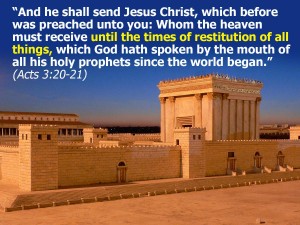 Acts 3:12-26
Acts 3:12-26
v13 God, the father of Jesus, is the God of the Jewish fathers. Still titled this, when God was about to bring about the destruction of the nation of Israel.
v18 The prophets (in the Old Testament) have detailed the life of Christ in prophecy. Peter and the apostles did not have the New Testament to teach from. They used the OT.
v19 Personal repentance is needed, that sins may be “blotted out” There is a time of “refreshing” coming.
v21 “all things will be restored” – again, all this is in the prophets. The NT does not give full details of this restoration as the OT does. Jesus makes only occasional reference to it, because it was so well known by all in Israel, and by all proselyte Gentiles. Note: Matthew 19:28.
v 22 Moses was faithful, as a servant, in the house of God – Israel (Heb 3). Christ is the SON over the house of God. God has commanded that Jesus shall be heard in preference to others – Luke 9:35
v25 The covenant made with the patriarchs involved a blessing on all the world – this is the great promise to Abraham (Genesis 12:1-3) which is called “the gospel” (Galatians 3:8). For us to be included, involves being adopted into the family of Abraham by baptism into the Lord Jesus Christ (Galatians 3:29).
v 26 The sacrifice of Christ, the forgiveness of sins is linked to the promise to Abraham (Galatians 3:14-16).
D The Promise to David
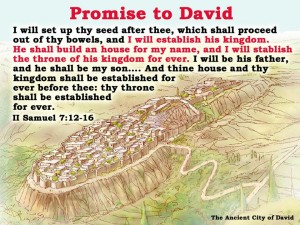 1,000 years before Christ was born, God promised King David a throne and a kingdom and a dynasty.
1,000 years before Christ was born, God promised King David a throne and a kingdom and a dynasty.
The words of the angel Gabriel to Mary before the birth of Christ (Luke 1:32,33) are in direct fulfillment of this promise to David (2 Samuel 7:10-16).
Peter, in his speech on the day of Pentecost, bases many remarks on the promise to David. Note the nature of his exposition – and his careful explanation of the Scriptures. Look at some of his use of OT references.
Acts 2:22-35
| V25-28 | Jesus’ resurrection based upon the prophecy of King David The miracle of Christ’s body not corrupting – Psalm 16 |
| V30 | The oath God made to David – the unchangeable promise of a throne and Kingdom for Christ over Israel– Psalm 132:11-15. NB Peter interprets the seed as Christ. (cp Luke 1:32,33) |
| V34 | David is dead, buried – and certainly NOT in heaven |
| V34-35 | David’s reverence for his own son. Psalm 110. Ultimately, the foes of Christ will be vanquished. Christ will yet act in a political sense to bring the world under control. |
| V36 | Peter pronounced the elevation of Christ (Acts 3:12) |
Next lesson: Organisation of the Believers – we must learn to live as a community with Christ as our head.




